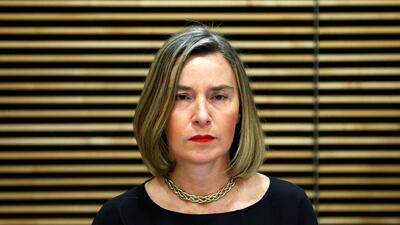The European Union has urged the United States not to go it alone in any effort to make peace between Israel and the Palestinians, warning that doing so would end in failure.
"Any framework for negotiations must be multilateral and must involve all players — all partners — that are essential to this process. A process without one or the other would simply not work, would simply not be realistic," EU foreign policy chief Federica Mogherini said.
"Nothing without the United States, nothing with the United States alone.
Ms Mogherini made her remarks at an emergency meeting of an international committee co-ordinating Palestinian development aid and political efforts. Government ministers from Israel and Egypt, as well as the Palestinian prime minister and a US senior official attended the talks.
As the meeting began, the EU announced a new funding package of 42.5 million euros (Dh194.2m) to help the Palestinians build a new state. It includes substantial support for East Jerusalem, which the Palestinians hope to make their future capital.
____________
Read more:
Israeli fans sue activists over cancelled Lorde concert
UN identifies companies linked to Israeli settlements
Israel sends Palestinian girl arrested in Jerusalem to Gaza — where she'd 'never been before'
____________
The Ad Hoc Liaison Committee meeting was the first of its kind since president Donald Trump recognised Jerusalem as Israel's capital in December last year, breaking with an international consensus that the holy city's status should be resolved in negotiations between Israel and the Palestinians.
Norwegian foreign minister Ine Eriksen Soereide, who chaired the Wednesday talks, said participants agreed to support any initiatives that would re-launch negotiations on resolving final status issues, including borders, security for Israel, the rights of Palestinian refugees and Jerusalem.
"We cannot achieve the state building goals until we have negotiations on the outstanding final status issues," she said.
Ms Soereide said she was "cautiously optimistic" about the chances for peace, "but I underline cautiously because we know that there is a lot of things that need to be done to push this process forward".
She noted that "increased financial support is urgently needed".
Israeli regional co-operation minister Tzachi Hanegbi said Israel has plans for a series of projects, including electricity grid expansion, sewage treatment and a desalination plant for impoverished Gaza, but that it wants international money to fund them.
"I did hear some representatives of countries saying that they are going be part of it, that they are going to pledge, they are going to help," he said. "If it's financed by the international community, of course it will happen."
Ms Mogherini said it was "a difficult moment" for the region but expressed hope that Wednesday's meeting would help in "restoring some trust and a level of confidence" among all those aiming to promote peace.
The Ad Hoc Liaison Committee is set to meet again in Brussels in late March and in New York in September.
Wednesday's meeting came as German foreign minister Sigmar Gabriel warned Israel that it faced growing frustration in Europe amid concern for the future of a two-state solution, Reuters reported.
Mr Gabriel adopted a markedly different tone to that of US vice president Mike Pence, who on a visit to Israel last week embraced Mr Trump's December 6 announcement that his administration recognises Jerusalem as the capital of Israel and will move the US embassy to the city.
"With regard to the Palestinians and the Iran question the Americans are taking your side more clearly than ever before. But is this really only a good thing?," Mr Gabriel said in Tel Aviv.
Citing past successes of US diplomacy in the region, he asked: "Can the Americans still play such a role if they take sides so openly? Will others try to step into their shoes?"
In a thinly veiled threat about cutting off aid, he said some members of Israel's cabinet were "explicitly against the two-state solution" but that such a solution "has always been the foundation of our engagement for Israeli- Palestinian peace and for the large amount of funding" from Germany and Europe.
"These — at best mixed — signals do not go unnoticed in Europe, where there is clearly growing frustration with Israel's actions," he told an Israeli security conference.
In Slovenia, meanwhile, officials delayed a decision on whether to recognise the Palestinian territories as a separate state after pressure from Israel and the US.
Slovenia's Parliament Foreign Policy Committee suspended its session on Wednesday pending official government position. The native country of US first lady Melania Trump could become only the second EU state to recognise a Palestinian state after Sweden.

